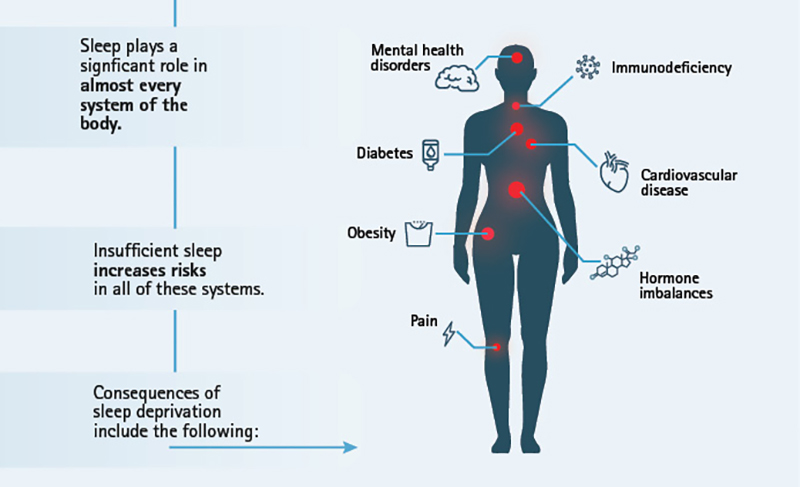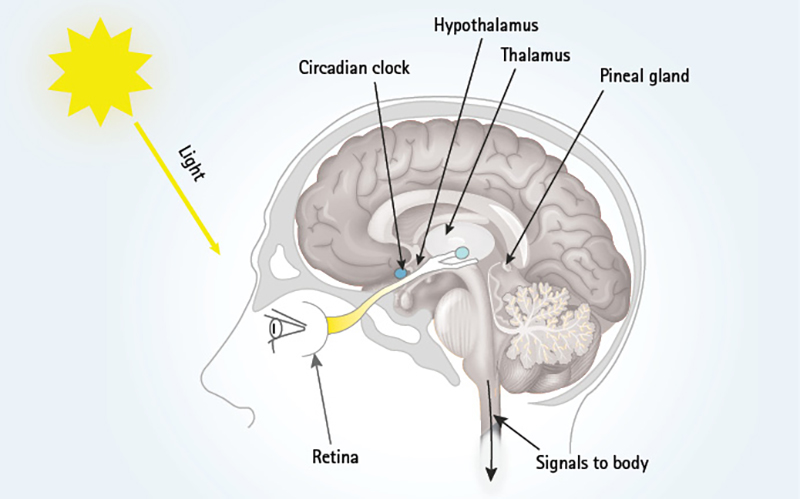BY BRIAN CRIMMINS
Firefighters’ shift work is proven to disrupt circadian rhythms. These naturally occurring cycles of day and night regulate brain and body function. Prolonged disruption to circadian rhythms causes a variety of ailments including metabolic dysfunction, reproductive dysfunction, heart disease, and psychological problems.
- Prioritizing Sleep for First Responders
- Addicted to Awake: Sleep Deprivation in the Fire Service
- The Sleepless Heart of the Fire Service
While we often can’t change our shift schedule, we can make key changes to our lifestyle for improved wellness, disease prevention, and normalized circadian rhythms. These lifestyle improvements are known as “biohacking” and rely on adopting new habits rather than taking medication.
The Biological Clock
From digestion to hormonal activity, human cells shift between activity and inactivity in 24-hour cycles. The most well-known circadian rhythm is the sleep cycle. Sleeping allows critical downtime for cells in our central nervous system to rest, repair, and regenerate. Without enough sleep on a given night, we wake with poor focus and memory. Sleep deprivation often leads to workplace injuries, auto accidents, and a host of other problems.
Our circadian rhythms are governed by a small part of the brain called the suprachiasmatic nucleus (SCN). Located above the roof of the mouth in the hypothalamus, the SCN serves as a biological clock. The SCN monitors stimuli from light, temperature, food, and exercise to regulate certain hormones and neurons that govern cellular activity. Animals, plants, bacteria, and fungi all have circadian rhythms like humans.
Disruption to the biological clock from shift work can be harmful in the long term. Studies show that circadian rhythm disruptions cause metabolic dysfunction with symptoms ranging from weight gain to type 2 diabetes. The risk for cardiovascular disease also increases, including heart failure, myocardial infarction, and arrhythmias. Jet lag (which can result from shift work) has been proven to decrease fertility and pregnancy outcomes. Psychological disorders such as depression and anxiety are correlated with poor sleep cycles. Finally, in 2007, the World Health Organization (WHO) identified shift work itself as a carcinogen.
Figure 1. Sleep Deprivation Consequences

Sleep deprivation can lead to multiple health problems. Source: National Institute of Neurological Disorders and Stroke, National Institutes of Health.
Biohacking Firefighter Rhythms
Experts recommend seven to eight hours of sleep per night. Long shifts keep firefighters awake and alert for extended periods of time and throughout the night. This places us out of sync with the earth’s diurnal (day and night) cycles. When working 24-hour shifts, the goal is to reconnect one’s own circadian rhythms with the earth’s diurnal cycles. However, in certain scenarios (e.g., an eight-hour night shift), experts recommend trying to stay on a modified schedule for at least two weeks at a time to allow the body to adapt to modified circadian rhythms. In either scenario, it is critical to try and remain as consistent as possible.
Biohacking is the process of taking strategic lifestyle interventions to improve health, wellness, and performance. As firefighters, we often cannot change our shift work, but we can form good habits for a better quality of life. These habits are centered around the SCN stimuli mentioned above: light, temperature, diet, and exercise. It bears noting that firefighters should speak with their doctors before changing their diet and exercise routines or taking supplements.
Exposure to light is the most important factor in regulating circadian rhythms. Light inhibits the body’s production of melatonin, the hormone that makes us feel sleepy. Bright lights in the evening will delay sleepiness, and bright lights in the morning help one fall asleep earlier. When someone is unable to sleep at the appropriate time, it is good practice to dim the lights two hours before getting into bed.
The National Institute for Occupational Safety and Health (NIOSH) has a simple message regarding sleep: “Increase your amount of light during the day to be more alert. Darken your bedroom room at night to sleep better.” The use of cell phones and electronic devices late at night and in bed will disrupt circadian rhythms. Specialized glasses and screen covers are available that claim to filter out blue light (the part of the light spectrum that stimulates the SCN), making screens safer for circadian rhythms. Blackout curtains are also effective in darkening bedrooms as much as possible.
The second factor impacting circadian rhythms is temperature. A person’s core body temperature and cortisol levels typically rise in the morning and fall in the evening. By contrast, melatonin levels typically fall in the morning and rise in the evening. Cortisol is the hormone associated with alertness while melatonin is associated with sleepiness. A cooler temperature (60°F to 73°F) in the bedroom will help to encourage sleepiness. Further, it is best to avoid long, hot showers in the evening, as they can disrupt body temperature cycles.
Exercise is the third way to regulate your circadian rhythms. Moderate to rigorous exercise often increases cortisol levels. Therefore, it is best to exercise during the daytime when alertness levels rise naturally. At nighttime, movement such as walking can be healthy if it is not too rigorous. Exercise also improves sleep, prevents or delays type 2 diabetes, and improves strength and wellness. NIOSH recommends at least 150 minutes of moderate exercise per week.
Healthy eating can help reset our circadian rhythms. When we are sleep deprived, levels of the hormone ghrelin rise and leptin fall, leading to hunger and sugar cravings. Overcoming a sleep deficit, along with properly timing meals and snacks, is critical. Overall, it is best to eat only during the daytime and avoid consuming any calories during the nighttime. The ideal diet to optimize circadian rhythms is high in fiber, vegetables, and fish, with the addition of some fermented foods such as yogurt.
Snacking between overnight emergencies is detrimental to the digestive system. As stated by author Satchin Panda, “If you want to improve your health and manage your diabetes, the first rhythm you should pay attention to is when you eat” (page 39). For time-restricted eating, it is recommended to limit eating to within a period of approximately eight to 10 hours every day. This practice is proven to improve metabolic dysfunction by controlling blood sugar levels.
Figure 2. The Circadian Clock

When light reaches the eyes, it activates photosensitive ganglion cells in the retina, which signal the suprachiasmatic nucleus (SCN) inside the hypothalamus. This information is passed to the pineal gland, which secretes the sleep hormone melatonin. Source: National Heart, Lung, and Blood Institute, National Institutes of Health.
Napping is another effective way to overcome sleep deficit without disrupting circadian rhythms. While it can take days to overcome sleep lost during a busy overnight shift, naps can make a small impact. Keep naps short, approximately 15 to 20 minutes. Early or midafternoon is the ideal time for a nap; it’s when energy and alertness begin to drop naturally.
Additional Remedies
After biohacking the lifestyle changes of light exposure, temperature, exercise, and eating, some firefighters may still have trouble with circadian rhythms. Additional remedies are available. For example, sleep apnea is often undiagnosed among adults and is proven to upset circadian rhythms. Restricting alcohol at night is also a positive lifestyle change, since alcohol disrupts sleep and interferes with blood sugar levels. Finally, melatonin supplements can be helpful. These supplements and other sleep medications generally help people fall asleep faster, but users should discuss possible adverse health effects with a medical professional.
Biohacking certain lifestyle changes into a firefighter’s life can reset circadian rhythms after a busy shift. These changes address exposure to light, temperature, diet, and exercise. These factors stimulate the SCN, which serves as the brain’s biological clock and controls the release of certain hormones. Depending on the type of shift, changes are designed to reconnect a person with the earth’s diurnal cycles or to establish a new cycle (such as a firefighter working an eight-hour overnight shift). Healthy circadian rhythms lead to a healthier metabolism and prevention of type 2 diabetes, weight gain, reproductive dysfunction, heart disease, and psychological disorders.
References
Crnko, S, Du Pré, B, C, Sluijter, JP, & Van Laake, LW. (2019). Circadian rhythms and the molecular clock in Cardiovascular Biology and disease. Nature Reviews Cardiology, 16(7), 437–447.
Mills, J., & Kuohung, W. (2019). Impact of circadian rhythms on female reproduction and infertility treatment success. Current Opinion in Endocrinology, Diabetes & Obesity, 26(6), 317–321.
The National Institute for Occupational Safety and Health. (2020, April 1). Reducing risks associated with long work hours. Centers for Disease Control and Prevention. Retrieved June 5, 2022.
Panda, S. (2020). The Circadian Code: Lose weight, supercharge your energy, and transform your health from morning to midnight. Rodale Books.
Straif, K, Baan, R, Grosse, Y, Secretan, B, Ghissassi, FE, Bouvard, V, Altieri, A, Benbrahim-Tallaa, L, & Cogliano, V. (2007). Carcinogenicity of shift-work, painting, and fire-fighting. The Lancet Oncology, 8(12), 1065–1066.
BRIAN CRIMMINS serves on the New Jersey Career Fire Chiefs’ Association and the Hoboken (NJ) Fire Department. He has a BA from Boston College and an MPA from John Jay College. His writing and teaching mostly focus on firefighter health and wellness.

